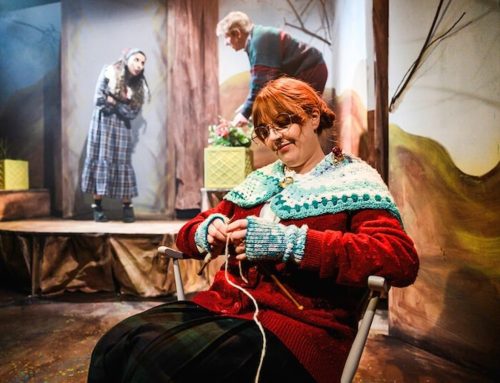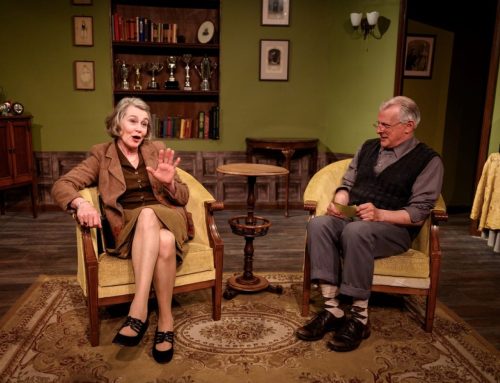There is certainly a timeliness to director Nick Bromley’s brilliantly funny revival of Richard Harris’ 2007 two-hander The Last Laugh. Adapted from an original Japanese comedy by Kōki Mitani, the play is set in an authoritarian dystopia whose army appears to be losing a grinding war of attrition with a neighbouring state (Mitani’s original sets in in Tokyo in 1942). The country’s Putinesque Great Leader, keen to control the flow of information, controls every stage production to ensure rigid adherence to approved political ideology. The role of Censor falls to a one-armed army officer (David Tarkenter, uniformed in the pitch-black and red palette beloved by fascists the world over) who would prefer to be on the frontline. He is a “soldier, not a pen-pusher”, has never been to the theatre, and would not know a joke if it bit him on the ear.
Enter the cynical and convictionless Writer (Matt Wake), desperate to get his thin comic spoof, Romeo and Juliet: The Comedy, approved for the stage. In this clash between a between authority and art, what compromises will the Censor and Writer make to enable this work to be shown? The question is answered in a gloriously funny battle of wits between the two, packed with energetic comedy and metatheatrical in-jokes, crowned by a scintillating central performance by Tarkenter. The end result is a piece that has something to say about the nature of belief and conviction but is also a near-perfectly executed ode to the tricks, techniques, and contrivances of the theatrical comedy canon.
Tarkenter’s Censor is a man burning with conviction, trying to do the right thing (or at least the things he thinks are right) for his country. Genuflecting to namby-pamby writers is not one of them. The highlight of this man’s day is stamping ‘rejected’ with a determined thud from his good arm on the pile of scripts in front of him. He sits stern and unsmiling behind a desk, prosthetic arm cocked like a gun ready to shoot, head lent back, looking down his nose at the Writer, as if faced with a petulant and complaining infant. Deliberate or otherwise, Tarkenter looks exactly like Dr Strangelove from Kubrick’s ‘60s movie masterpiece.
Much as with a parent, any accommodation with the Writer is going to be on the Censor’s dour and disapproving terms. In a lukewarm display of willing he suggests what he claims are sensible improvements to the piece: change Romeo for the much more heroic Henry V, write in a propaganda role for the local police chief, insert the injunction God Save Our Leader several times into the work, and change Juliet’s poison for a suppository (much more effective attests the Censor). One suspects an official as unintentionally odd as this would not survive long in Putin’s Russia.
Wake plays the Writer with the guileless energy of a pantomime principal boy, apt for a play that oozes broad comedy farce and physical humour. Armed with chocolates and a bird box for the Censor’s injured pet crow, he sets out to explain how his play (which he resignedly labels “low art inspired by high motives”) works to make people laugh. It is a kind of Dummies Guide To Comedy: the set-up, the catchphrase, the rhythm, the careful repetition, the double-take, the dead-pan delivery, the methods actors have for stealing laughs from and upstaging each other. He is not so much exposing comedic tricks as celebrating them. Subverting the Censor’s intentions at every turn, the newly titled Henry and Juliet soon turns to be rather different than the original: a much funnier piece of work, whose development we see laid out in splendid comic detail in front of us.
Bromley directs with a restrained momentum that gets the best from the show’s potentially challenging episodic structure. Benefitting from exuberant comic rapport between the leads (the emerging relationship between the two is almost father and son-like in its affect), The Last Laugh is a poem to the transformative potential of theatre. Of course, in a real totalitarian state like Russia there is only ever one winner of a tussle between authority and artist. No spoilers here, but one of these characters is on a journey to understanding what it is to have real convictions. The play we see emerge in the final scene is the one the that should have been penned in the first place. The other is on a journey to questioning fixed beliefs. The final twist in the tail hints he may just walk that path further. Tremendous fun.
Director: Nick Bromley
Writer: Richard Harris adapted from an original play by Kōki Mitani
Duration: 2 hours. One interval.


More Recent Reviews
Playfight. Soho Theatre.
Writer Julia Grogan’s breathtakingly assured debut play arrives at Soho Theatre following stellar reviews at the Edinburgh Fringe and [...]
All The Happy Things. Soho Theatre.
Naomi Denny’s three-hander comedy-drama All The Happy Things covers familiar themes within a recognisable premise. A grieving protagonist comes [...]
Telly. Bread and Roses Theatre.
The challenge with absurdist comedy is that many people do not find it funny. Laughing at the sheer weirdness [...]



